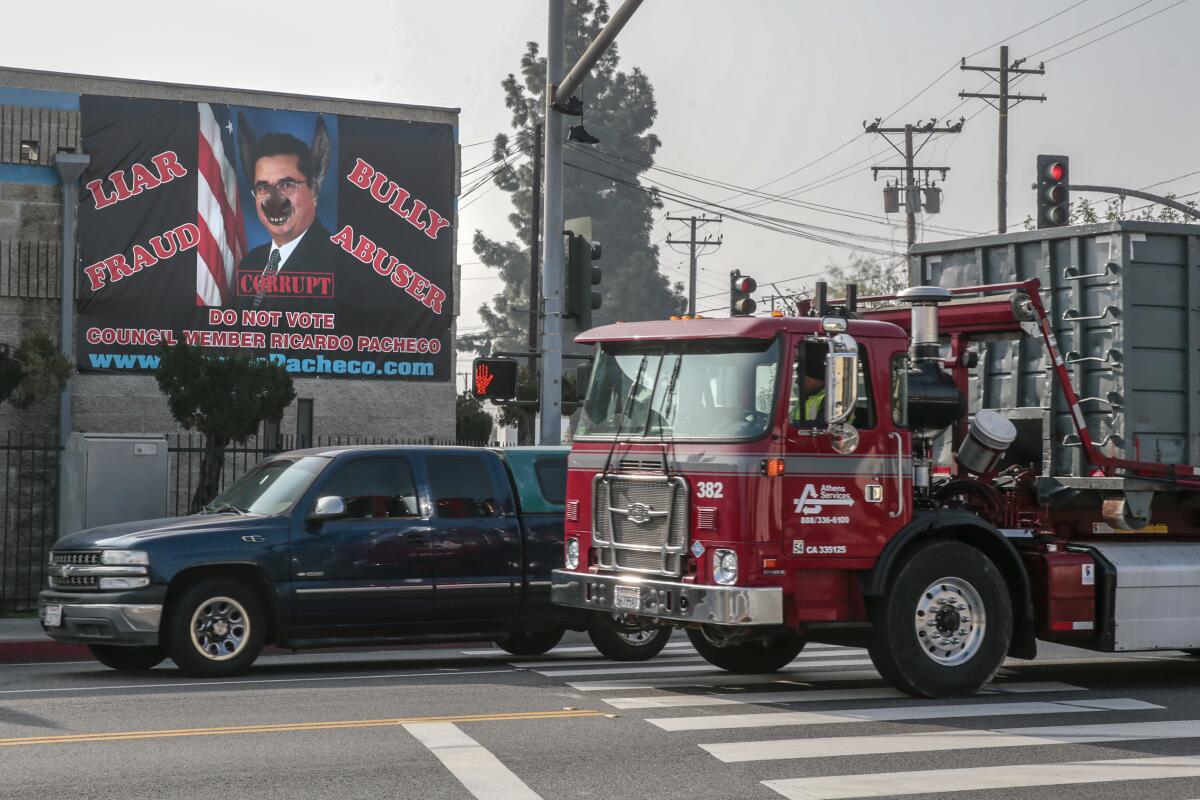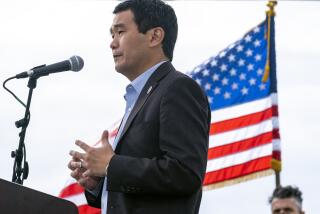Sign showing councilman as ‘corrupt’ donkey at center of 1st Amendment tiff

- Share via
Two large banners put on public display last spring that called Baldwin Park Councilman Ricardo Pacheco a “fraud” and “liar” are at the center of a legal dispute over 1st Amendment rights.
Albert Ehlers hung the banners from his Ramona Boulevard business in April after a jury found Pacheco — Baldwin Park’s longest-serving council member — guilty of racial and sexual discrimination against the city’s former police chief.
The 6-foot wide by 12-foot long banners, with an image of Pacheco manipulated to give him donkey ears and features, call him a “bully,” “fraud,” “liar” and an “abuser” and instruct local citizens not to reelect him. Onlookers were also directed to a website about Pacheco that was the subject of a previous lawsuit involving a similar political sign in 2017.
Shortly after the banners were displayed, the city began fining Ehlers for violating the city’s sign ordinance for neglecting to obtain a permit. After racking up more than $12,000 in fines, Ehlers’ son Robert and the Baldwin Park Free Speech Coalition sued the city for violating Ehlers’ 1st Amendment rights, arguing that he is being fined only because of the banner’s content.
The city has since filed a misdemeanor complaint against Ehlers, who is slated to be arraigned in court in February.
Paul Cook, a Baldwin Park activist and lawyer representing Ehlers who had previously represented plaintiff Greg Tuttle in the 2017 case, believes the city’s actions are baseless and the result of retaliation and political censorship.
“They’re acting like parents that are saying, ‘You need to get our permission to express yourself.’ That’s not what the 1st Amendment is,” he said.
Cook, who was the subject of an unsuccessful restraining order filed by Baldwin Park Mayor Manuel Lozano in 2015, plans to file an injunction in February. He believes that the city’s sign ordinance is being used for political retribution.
“We’re trying to strike down the law as a whole because we believe it’s illegal,” he said.
In 2017, the city allowed Tuttle to continue displaying his Pacheco sign, which also portrayed the council member as a donkey.
Gregory Palmer, the attorney representing the city, declined to comment. Pacheco could not be reached for comment.
Pacheco was elected in 1997 to the City Council. In March 2019, a jury awarded former Police Chief Lili Hadsell $7 million after she sued the city for gender discrimination, harassment and retaliation. The decision affirmed that she was fired because she is a woman.
According to court records, Hadsell experienced growing hostility from male colleagues and city leaders, especially from her subordinate Michael Taylor — who would later replace her as police chief — and Pacheco.
In 2013, Hadsell was fired from her position in what the mayor referred to in a text message as a retaliatory action. Four years earlier, Hadsell had removed Taylor from the chain of command. According to court records, Pacheco screamed at Hadsell over Taylor’s removal and threatened to force her to resign if she did not do so herself.
Meanwhile, Taylor and Pacheco have been accused in a civil lawsuit of engaging in a water district bribery and kickback scheme that cost ratepayers roughly $1 million.
More to Read
Sign up for Essential California
The most important California stories and recommendations in your inbox every morning.
You may occasionally receive promotional content from the Los Angeles Times.











